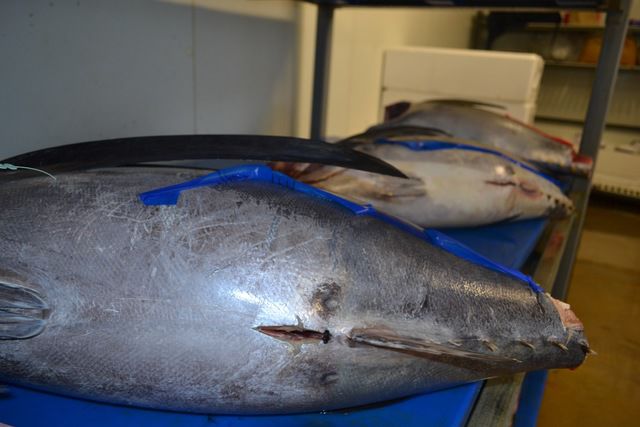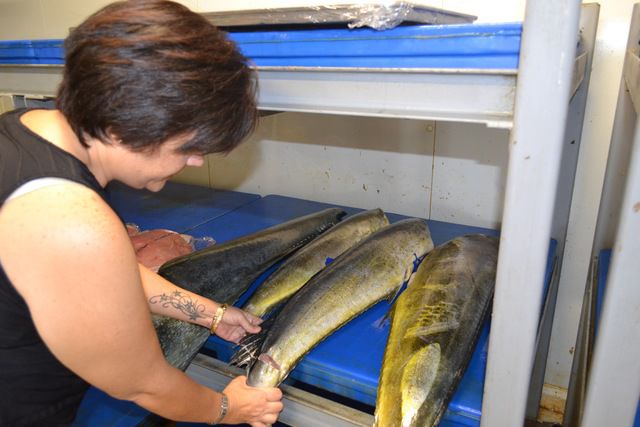PUHI — Liana Soong says a proposed expansion of a national marine monument in Hawaii could mean big losses for fishing sales. Soong, Tropic Fish Kauai sales representative, said the proposed expansion of Papahanaumokuakea Marine National Monument may mean fewer
PUHI — Liana Soong says a proposed expansion of a national marine monument in Hawaii could mean big losses for fishing sales.
Soong, Tropic Fish Kauai sales representative, said the proposed expansion of Papahanaumokuakea Marine National Monument may mean fewer fish from local fisherman and more imported products.
“It’s these restaurants that buy from us daily, from local fishermen, from the auction block, they’re paying a pretty penny,” she said. “But importing is going to cost us way more. We’re going to be burning fossil fuels to bring fish in. The consumer is the one ultimately paying the price.”
Soong said the expansion would hurt the Hawaii Fish Auction tremendously.
“At least 90 percent of the fish that will be brought in will be imports, which will affect the quality, affect the price,” said Soong, whose company buys about $20 million of fish off the block a year. “And we’ll just be hurting other people’s fisheries. Right now, we have a sustainable fishery.”
About 60 island restaurants and grocery stores depend on fish caught by local fishermen, Soong said. Tropic Fish purchases about $10,000 of fish weekly from Kauai fishermen, she said.
“For our children, we need to be able to provide our own food,” Soong said. “If we cannot grow enough produce to support our family or catch our own fish, then we might as well live on the Mainland. What sets us apart from anyplace else except higher everything?”
But over a dozen chefs, restaurants and businesses on Kauai are showing their support for the expansion, according to a letter to President Barack Obama.
“We know and rely on Hawaii seafood,” the letter reads. “We consider it our kuleana (responsibility) to promote sustainably sourced seafood and also help educate others about ocean conservation needs in Hawaii and across the world.”
Marshall Blanchard, The Beach House executive chef, said it’s important to support the local economy by supporting local fishermen and ocean conservation.
“This goes full circle because we are working with our neighbors and we are working together as a community,” Blanchard said. “I know the food is not coming from somewhere else in the world.”
The group claims the expansion of the monument will help replenish fish populations in Hawaii and and will have little to no negative impact on Hawaii’s economy.
“We need a bold step like this because times have changed,” said Sam Choy, Hawaii chef and restaurateur. “Warming waters, bleached corals, over-fishing and pollution are wreaking havoc on our ecosystems and threatening the vital habitat necessary for marine creatures to survive.”
Some Kauai and state lawmakers, however, think otherwise.
In a letter to President Obama, Hawaii Senate President Ronald Kouchi said the monument’s current boundary eliminated 50 percent of Hawaii’s bottom fish fishery, with the proposed expansion to reduce 8 percent of the long-line fishing industry.
Kouchi said the reduction would result in a loss of 2.2 million pounds of fish, or a loss of $6.8 million.
“The fishing and seafood industry is an integral part of Hawaii’s culture, identify and economy,” Kouchi said.
In a similar letter to the president, 30 Hawaii legislators, including Reps. Dee Morikawa, Derek Kawakami and James Tokioka, expressed their opposition to the proposed expansion.
John Hurd, a panel member on the Western Pacific Fishery Management Fishing Industry Advisory Committee, said he believes the proposed expansion will create a snowball effect if passed.
“I don’t think the government will stop there,” Hurd said. “It’s just going to continue to chip away, chip away, until they take everything.”
Hurd said the area Kauai fishermen are worried about is the Middle Bank, which is 80 miles northwest of Kauai.
“The monument is right by the boundary,” he said. “Just with a stroke of a pen, we could lose that entire area.”
Robert Richmond, University of Hawaii at Manoa Kewalo Marine Laboratory director and professor, said one of the main beneficiaries of establishing Papahanaumokuapea as a large marine protected area is to protect fish populations so they can recover.
“You look at the ocean as a bank account, making sure you leave something behind, and that’s just classic economics,” Richmond said. “A lot of these arguments you’re hearing — it’s going to be the collapse of the fishery, these guys are going to go broke — it’s simply not true.”
The proposal to expand Papahanaumokuakea calls for increasing the existing monument from 50 nautical miles to the 200 nautical mile limit of the Northwestern Hawaiian Islands’ exclusive economic zone (EEZ), with exception of the waters surrounding the islands of Niihau and Kauai.



